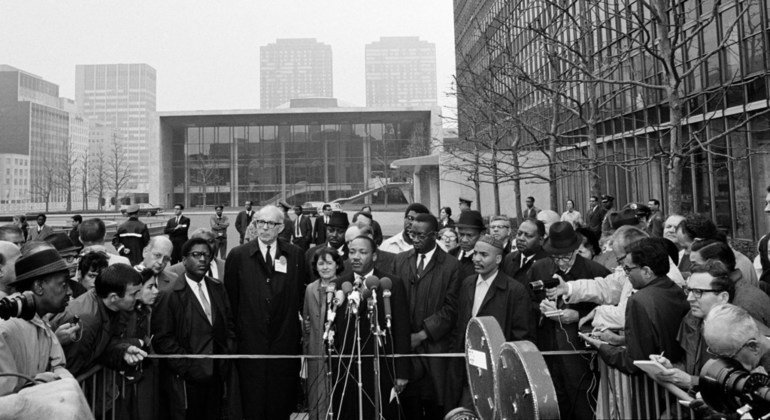On April 15, 1967, a historic delegation led by Dr. Martin Luther King Jr. met with the legendary Ralph Bunche and other top officials at the United Nations. Ralph Bunche, the first African American to receive the Nobel Peace Prize, and Dr. King, the second, came together to discuss pressing issues of the time. This meeting took place during a tumultuous period in American history, with the Vietnam War raging on and civil rights movements gaining momentum across the nation.
The meeting between Dr. King and UN officials was significant as it marked a collaboration between the civil rights movement and international diplomacy. Dr. King presented a petition calling for an immediate and peaceful resolution to the Vietnamese conflict that was ongoing from 1961 to 1975. This act demonstrated Dr. King’s commitment to peace and justice not only within the United States but also on a global scale.
Earlier on the same day, Dr. King had participated in a massive protest alongside 125,000 demonstrators, marking the beginning of a series of protests against the Vietnam War. These protests would become a defining feature of the anti-war movement in the United States during the 1960s and 1970s. The meeting at the UN headquarters and the subsequent protest highlighted Dr. King’s dedication to nonviolent activism and his belief in the power of peaceful resistance.
Dr. King’s message of “no justice without peace, no peace without justice” resonated throughout his activism, both domestically and internationally. His advocacy for civil rights and peace inspired future generations to continue the fight for equality and justice. Dr. King’s legacy lives on through the work of activists around the world who continue to push for social change and human rights.
The impact of Dr. King’s visit to the United Nations in 1967 was profound, both in terms of his anti-war activism and his broader message of peace and justice. His words continue to echo through time, reminding us of the importance of standing up for what is right and striving for a better world for all.
In the years following his visit to the UN, Dr. King continued to advocate for peace and justice until his tragic assassination in 1968. His untimely death marked the end of a remarkable era in American history, but his legacy lives on in the hearts and minds of those who continue to fight for equality and human rights.
Dr. King’s granddaughter, Yolanda Renee King, has followed in his footsteps as an activist for social justice. At just 15 years old, she addressed a special commemoration at the UN General Assembly Hall in honor of the International Day of Remembrance of Victims of Slavery and the Transatlantic Slave Trade. Yolanda’s speech echoed her grandfather’s message of hope and resilience, inspiring all those in attendance to continue the fight for a more just and equitable world.
As we reflect on Dr. King’s visit to the United Nations and his lifelong commitment to peace and justice, we are reminded of the power of one individual to make a difference in the world. Dr. King’s legacy serves as a beacon of hope for future generations, inspiring us all to work towards a more peaceful and just society for all.









